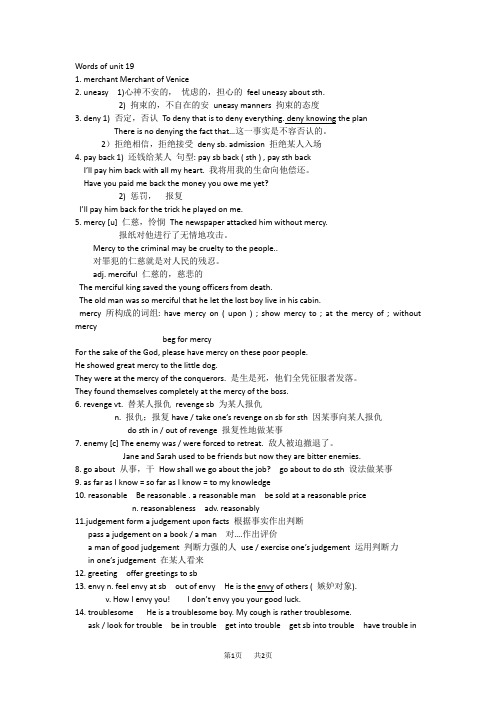unit19
- 格式:doc
- 大小:38.00 KB
- 文档页数:1

Words of unit 191. merchant Merchant of Venice2. uneasy 1)心神不安的,忧虑的,担心的feel uneasy about sth.2) 拘束的,不自在的安uneasy manners 拘束的态度3. deny 1) 否定,否认To deny that is to deny everything. deny knowing the planThere is no denying the fact that…这一事实是不容否认的。
2)拒绝相信,拒绝接受deny sb. admission 拒绝某人入场4. pay back 1) 还钱给某人句型: pay sb back ( sth ) , pay sth backI’ll pay him back with all my heart.我将用我的生命向他偿还。
Have you paid me back the money you owe me yet?2) 惩罚,报复I’ll pay him back for the trick he played on me.5. mercy [u] 仁慈,怜悯The newspaper attacked him without mercy.报纸对他进行了无情地攻击。
Mercy to the criminal may be cruelty to the people..对罪犯的仁慈就是对人民的残忍。
adj. merciful 仁慈的,慈悲的The merciful king saved the young officers from death.The old man was so merciful that he let the lost boy live in his cabin.mercy 所构成的词组: have mercy on ( upon ) ; show mercy to ; at the mercy of ; without mercybeg for mercyFor the sake of the God, please have mercy on these poor people.He showed great mercy to the little dog.They were at the mercy of the conquerors. 是生是死,他们全凭征服者发落。

高一英语Unit19 Modern Agriculture人教版【本讲教育信息】一. 教学内容:Unit19 Modern Agriculture二. 教学目标掌握Unit 19词汇与词性变化三. 教学重难点掌握课文中的重点句型的结构、用法Unit19 Modern Agricultureproduce v. 生产,产生 n. 农产品Their efforts produced no effects.She produced another short story.Smoking produces all kinds of diseases.production n. 生产protection n. 保护protective a. 保护的technique n. 技术,技巧,方法technical a. 技术的,科学的technician n. 技术员modernize v. 使…现代化modernization n. 现代化depend on 依靠dependent a. 需要依靠人的independent a. 独立的short a. 短缺in shortbe short ofshortage n. 短缺modify v. 修改,调整The inventor modified his design.practical a. 实际的,实用的guide n. 向导 v. 引导condition n. 条件,情况in good/poor conditionin no condition to doHe was allowed to go out, but his parents made it a condition that he should finish his homework first.The firefighters must work in/under very hard conditions.on condition thaton no conditionremove v. 祛除,搬家He removed the ices from the water.They have removed from London to New York.课文重难点:P43 WARMING UPHow are people’s eating habits changing over the years?over the years多年以来,相当于during the yearsWhat effects do you think the changes in eating habits will have on agriculture or nature?注意此句的断句,have与on是分开的,主干是What effects will the changes have on agriculture or nature?P45 READINGIt is on this arable area that the farmers produce food…强调句,试着把它变回原句The farmers produce food…on this arable area.Over time, many farming techniques have been modernized…over time长久以来,许多农业技术已经被现代化了To make as much use of the land as possible…as…as possible 结构two or more crops are planted each where possible.状语从句中的主语加be动词可以省略,但是对be动词后面的结构有要求。



四下英语第19课生字组词北京版The English language is a rich and diverse means of communication that continues to evolve and expand with each passing year. As students progress through their educational journey, they are introduced to an ever-increasing array of vocabulary words that not only broaden their linguistic abilities but also provide them with the tools to effectively express themselves in a variety of contexts. One such example can be found in the 4th grade English textbook used in Beijing, where Unit 19 introduces a captivating collection of new words for students to explore and incorporate into their growing linguistic repertoire.At the heart of this unit lies a focus on the concept of word formation, specifically the process of creating new words by combining existing ones. This is a fundamental aspect of language development, as it allows speakers to convey complex ideas and nuanced meanings through the strategic assembly of familiar building blocks. By delving into this unit, students not only expand their vocabulary but also gain a deeper understanding of the structural and semantic relationships that underpin the Englishlanguage.One of the key vocabulary words introduced in this unit is "compound." A compound word is formed by combining two or more individual words to create a new term with a distinct meaning. For example, the word "sunflower" is a compound word, composed of the words "sun" and "flower." Similarly, "heartbreak" is a compound word that combines "heart" and "break" to convey the emotional anguish of a broken heart. Students learn to recognize and identify compound words, as well as to create their own by blending familiar terms in meaningful ways.Another important concept covered in this unit is the idea of prefixes and suffixes. Prefixes are word parts that are added to the beginning of a root word to modify its meaning, while suffixes are added to the end of a word to change its grammatical function or impart additional meaning. By understanding the roles and functions of these linguistic building blocks, students can unlock the secrets of word formation and expand their vocabulary exponentially.For instance, the prefix "un-" can be added to the word "happy" to create the word "unhappy," which conveys the opposite meaning. Similarly, the suffix "-ful" can be added to the word "wonder" to create "wonderful," transforming the noun into an adjective. Through numerous examples and exercises, students in this unit learn torecognize and apply prefixes and suffixes to create new words, fostering their linguistic creativity and problem-solving skills.In addition to compound words and affixes, this unit also explores the concept of root words and their derivatives. A root word is the core element of a word, to which prefixes and suffixes can be added to create new terms. By understanding the meanings of common root words, students can more easily decipher the meanings of unfamiliar words and make connections between related terms.For instance, the root word "act" can be found in a variety of words, such as "action," "active," "activity," and "actor." By recognizing the shared root, students can infer the core meaning of these words and use context clues to determine their specific applications. This not only enhances their vocabulary but also strengthens their overall comprehension and language skills.Throughout this unit, students are encouraged to engage in various activities and exercises that reinforce the concepts of word formation. These may include identifying compound words, analyzing the structure and meaning of words with prefixes and suffixes, and exploring the relationships between root words and their derivatives. By actively participating in these learning experiences, students develop a deeper understanding of the English language and its underlying principles, equipping them with the linguistic tools theyneed to communicate effectively in a wide range of contexts.Moreover, the vocabulary introduced in this unit is carefully selected to reflect the diverse and dynamic nature of the English language. The words cover a broad range of topics, from everyday objects and actions to more abstract concepts and ideas. This variety not only expands students' lexical knowledge but also helps them to navigate the complexities of the language and apply their newfound skills in meaningful ways.As students progress through this unit and continue to build their vocabulary, they will undoubtedly encounter words that challenge their understanding and push the boundaries of their linguistic abilities. However, it is precisely these moments of discovery and growth that make the learning process so rewarding. By embracing the challenges and actively engaging with the material, students develop a greater appreciation for the richness and nuance of the English language, and they become better equipped to express themselves with clarity, precision, and confidence.In conclusion, the 4th grade English textbook's Unit 19, with its focus on vocabulary development and word formation, represents a significant milestone in the educational journey of students. By delving into the intricacies of compound words, prefixes and suffixes, and root words, students not only expand their lexical repertoire butalso cultivate a deeper understanding of the structural and semantic relationships that underpin the English language. This knowledge, in turn, empowers them to communicate more effectively, think more critically, and engage more deeply with the world around them. As students continue to explore and master the vocabulary introduced in this unit, they will undoubtedly find themselves better prepared to navigate the linguistic landscape of the English language, both now and in the years to come.。
